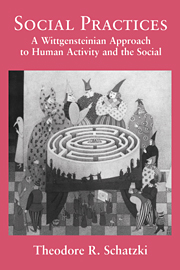Book contents
6 - PRACTICES AND SOCIALITY
Published online by Cambridge University Press: 17 September 2009
Summary
By itself, the practice theoretical consolidation of practice as nexus and practice as do-ing reveals practices as a site of sociality in human life. For the interrelatedness of participants in a practice is secured merely by the fact that the understandings, rules, and teleoaffective structure organizing the practice govern actions of all participants. As we shall see, practices open fields of sociality and social order richer than simple commonalities in what governs behavior. These more elaborate fields also furnish the material with which the composition of social formations such as groups, institutions, and systems can be analyzed.
The current chapter stops short of substantiating the latter thesis by carrying out the indicated analysis. It instead simply makes good the claim announced in the opening chapter, that an account of practices can be developed on the background of Wittgenstein's late remarks on mind and language (1) that reinforces the practice theoretical faith that practices represent an alternative starting point for social ontology; (2) that offers a platform for the ontological comprehension of social affairs that is broader and more adequate than those represented by current accounts of practice; (3) that respects the locality and complexity of social affairs emphasized not only by practice theorists, but also by thinkers contentiously labeled “post-modern”; and (4) that delivers additional insights into the social constitution of the individual, thus reinforcing the refusal to make individuals the exclusive starting point for the comprehension of social life.
- Type
- Chapter
- Information
- Social PracticesA Wittgensteinian Approach to Human Activity and the Social, pp. 168 - 209Publisher: Cambridge University PressPrint publication year: 1996



